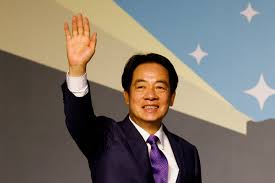Taiwan’s Historic Inauguration: Lai Ching-te’s Presidency Amidst China’s Resistance

20.05.2024: In a groundbreaking ceremony, Lai Ching-te took the oath of office as Taiwan’s president, marking the initiation of a remarkable third consecutive term for the Democratic Progressive Party (DPP). The DPP’s steadfast advocacy for democracy has stood firm against the persistent threats posed by authoritarian China.
Lai, a distinguished former doctor and vice president at 64, assumed the presidency alongside Vice President Hsiao Bi-khim, a recent envoy to the United States. Their party’s unwavering stance on Taiwan’s sovereignty has drawn ire from Beijing, which claims the self-ruling democracy as part of its territory without historical control.
The new president succeeds his DPP predecessor, Tsai Ing-wen, renowned for elevating Taiwan’s international stature during her eight-year tenure. Lai’s inaugural address stressed continuity with Tsai’s achievements, highlighting a message of peace and prosperity across the Taiwan Strait.
Amidst a fiercely contested election, Lai’s victory over opposition parties signified voters’ dismissal of Beijing’s warnings against DPP’s re-election. The DPP’s viewpoint asserts Taiwan’s de facto sovereignty, advocating for strengthened defenses and deepened ties with democratic allies despite potential repercussions from Beijing.
Lai, once a vocal advocate for Taiwan independence, now adopts a nuanced stance favoring the current status quo. This strategic approach mirrors Tsai’s diplomatic finesse, essential for navigating Taiwan’s complex relations amidst China’s growing assertiveness.
The inauguration ceremony attracted international attention, with representatives from countries maintaining formal ties with Taiwan, former American officials, and lawmakers in attendance. US Secretary of State Antony Blinken’s congratulatory message underlines support for Taiwan’s democracy and commitment to peace in the region.
However, challenges loom as Beijing continues to reject dialogue and denounce Lai as a separatist. Lai’s parliamentary agenda faces scrutiny with a lack of majority, a scenario reminiscent of recent parliamentary clashes over reform bills.
As Lai embarks on his presidency, Taiwan’s resilience against Beijing’s pressures remains a focal point. The nation’s steadfast determination towards maintaining sovereignty and democratic values underscores the significance of this historic inauguration amidst regional tensions.

